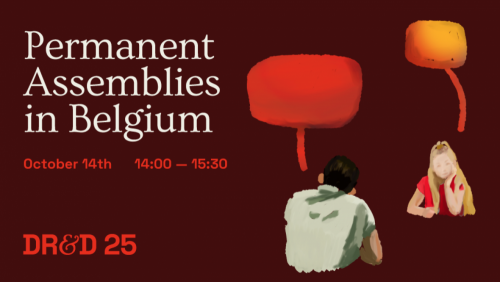
https://www.linkedin.com/events/7381645317143674881/
Event linkhttps://www.youtube.com/live/UCxYhnKwTLs?si=7aFRLhOSvtyHHwm9
About
First, there was the unanimous vote of the Parliament of the German-speaking community of Belgium in February 2019 on a law installing a permanent citizen assembly connected to its work (so-called “Ostbelgien Model”). In the same year, the Brussels Regional Parliament installed so-called “mixed committees” where citizens drawn by lot sit side by side with elected politicians (with 3 citizens for every politician). Then, in 2022, the Brussels Regional Government decided to create a permanent citizen assembly to receive input for its climate policy. Finally, the parliament of the Walloon Region followed suit in 2024 and also voted a bill to add citizens’ assemblies drawn by lot to its parliamentary work. Even the Belgian federal parliament voted a law on sortition and added to the possibility of having deliberative assemblies, but it has not yet put that law into action.
This session will bring people who have been involved in the running of three of these assemblies together for a public exchange: The Ostbelgien Model, the Brussels “mixed committees”, and the Brussels Permanent Climate Assembly. We will hear about the functioning of these assemblies and what they have learned over time. What worked and what didn’t…
Speakers
Eva Johnen is a lawyer and has been working in the administration of the Parliament of the German-speaking Community of Belgium since 2008. As secretary of the parliamentary commission that explored opportunities for citizen participation following the experiences of the G1000, she was involved in the preparatory work for the Ostbelgien Modell, which was introduced in 2019. After an interlude as head of the German-speaking Community's representation in Brussels, she has been part of the Citizen Dialogue team since October 2024, responsible for external presentation and as backup to the Dialogue’s permanent secretary.
Jonathan Moskovic is a senior expert in deliberative democracy who has worked for over a decade on citizens’ assemblies in Belgium and internationally. He co-coordinated the G1000 citizens’ movement launched in 2011 and later played a central role in establishing the deliberative committees of the Brussels Parliament, the first permanent body worldwide where randomly selected citizens and parliamentarians deliberate together. He has since supported processes in Europe, Africa, the Middle East, and North America through advocacy, training, and methodological guidance.
Merlijn De Rijcke has been active since 2022 as the secretary of the Citizen Assembly on Climate at “Bruxelles Environment”, the department at the Brussels administration responsible for climate and energy. In his role of secretary, he is responsible for the organisation and follow-up of the Citizen Assemblies on Climate. In the framework of the CA on Climate, every year, a new group of citizens drawn by lot meets to formulate recommendations on a specific topic linked to climate policy.
The conversation between them will be moderated by Dr. Nabila Abbas, FIDE - Europe, who has been working on permanent citizen assemblies and recently published a KNOCA briefing on the topic together with Prof. Graham Smith. President of the Dutch-speaking branch of the Brussels Parliament, Lotte Stoops, will give a brief welcome, and Ben Eersels, the Executive Director of the G1000, will explain why Belgium has grown into this leadership role and how civil society played a key role in this process.
Finally, Marjan Ehsassi, FIDE – North America’s Executive Director, will provide an outsider reflection on the ‘Belgian examples’.
There will be ample time for questions from the public. This event assumes basic knowledge of sortition-based citizens’ assemblies.









